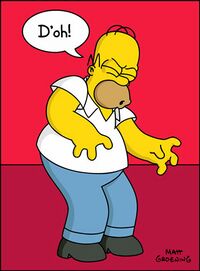
Difference between revisions of "Template:Featured Article"
(sorry, pressed the wrong button) |
|||
| Line 1: | Line 1: | ||
| − | ==Featured Article== | + | ==Featured Article== |
| − | |||
| − | |||
| − | + | [[Image:d'oh.jpg|left|200px]] | |
| − | + | ''[[D'oh]]'' (represented in the shows script as "annoyed-grunt") is [[Homer Simpson]]'s famous catchphrase. It is used when Homer hurts himself, finds out something to his embarrassment or chagrin, is outsmarted, or undergoes or anticipates misfortune. | |
| − | + | When [[Dan Castellaneta]],Homer's voice actor, was first asked to voice the exclamation, he rendered it as a drawn out "doooh", inspired by Jimmy Finlayson, the moustached Scottish actor who appeared in many Laurel and Hardy films. Finlayson coined the term as a minced oath to stand for the word "Damn!" The show's creator [[Matt Groening]] felt that it would better suit the timing of animation if it were spoken faster so Castellaneta shortened it to "D'oh!" | |
| − | + | It was first heard on a Tracey Ullman Show short entitled "[[Punching Bag]]", which aired on November 27, 1988. When Bart and Lisa try to hide a punching bag with his face on it, and it knocks him out. Homer's reaction is "D'oh!" The next occasion it was heard was in the first episodes of The Simpsons, "[[Simpsons Roasting on an Open Fire]]", airing on December 17, 1989. | |
| − | [[Wikisimpsons:Previous Featured articles|More featured articles]] [[Wikisimpsons:Vote for Featured article|Vote for Featured article]] | + | Variations of the catchphrase have been heard in numerous episodes, suiting a different situation, examples include [[Simpsons Roasting on an Open Fire|"Ho-ho-d'oh!"]],[[Bart of Darkness|"D'oheth!"]],[[Thirty Minutes over Tokyo|"shimatta-baka-ni"]] and [[The Simpsons Movie|"D'oooooooooooooome!!"]]. |
| + | |||
| + | Many episodes have also use (annoyed grunt) in their titles, because d'oh didn't originally have an official spelling, such as [[Simpsoncalifragilisticexpiala(Annoyed Grunt)cious]] and [[I, (Annoyed Grunt)-Bot]], but other use the shortened term d'oh, such as [[C.E. D'oh]] and [[D'oh-in' in the Wind]]. | ||
| + | |||
| + | The term d'oh was added to the Oxford English Dictionary in 2002, with the definition:''”Expressing frustration at the realization that things have turned out badly or not as planned, or that one has just said or done something foolish. Also (usu. mildly derogatory) implying that another person has said or done something foolish (Duh).”'' | ||
| + | |||
| + | [[Wikisimpsons:Previous Featured articles|More featured articles]]♦ [[Wikisimpsons:Vote for Featured article|Vote for Featured article]] | ||
Revision as of 13:33, March 26, 2009
Featured Article
D'oh (represented in the shows script as "annoyed-grunt") is Homer Simpson's famous catchphrase. It is used when Homer hurts himself, finds out something to his embarrassment or chagrin, is outsmarted, or undergoes or anticipates misfortune.
When Dan Castellaneta,Homer's voice actor, was first asked to voice the exclamation, he rendered it as a drawn out "doooh", inspired by Jimmy Finlayson, the moustached Scottish actor who appeared in many Laurel and Hardy films. Finlayson coined the term as a minced oath to stand for the word "Damn!" The show's creator Matt Groening felt that it would better suit the timing of animation if it were spoken faster so Castellaneta shortened it to "D'oh!"
It was first heard on a Tracey Ullman Show short entitled "Punching Bag", which aired on November 27, 1988. When Bart and Lisa try to hide a punching bag with his face on it, and it knocks him out. Homer's reaction is "D'oh!" The next occasion it was heard was in the first episodes of The Simpsons, "Simpsons Roasting on an Open Fire", airing on December 17, 1989.
Variations of the catchphrase have been heard in numerous episodes, suiting a different situation, examples include "Ho-ho-d'oh!","D'oheth!","shimatta-baka-ni" and "D'oooooooooooooome!!".
Many episodes have also use (annoyed grunt) in their titles, because d'oh didn't originally have an official spelling, such as Simpsoncalifragilisticexpiala(Annoyed Grunt)cious and I, (Annoyed Grunt)-Bot, but other use the shortened term d'oh, such as C.E. D'oh and D'oh-in' in the Wind.
The term d'oh was added to the Oxford English Dictionary in 2002, with the definition:”Expressing frustration at the realization that things have turned out badly or not as planned, or that one has just said or done something foolish. Also (usu. mildly derogatory) implying that another person has said or done something foolish (Duh).”

